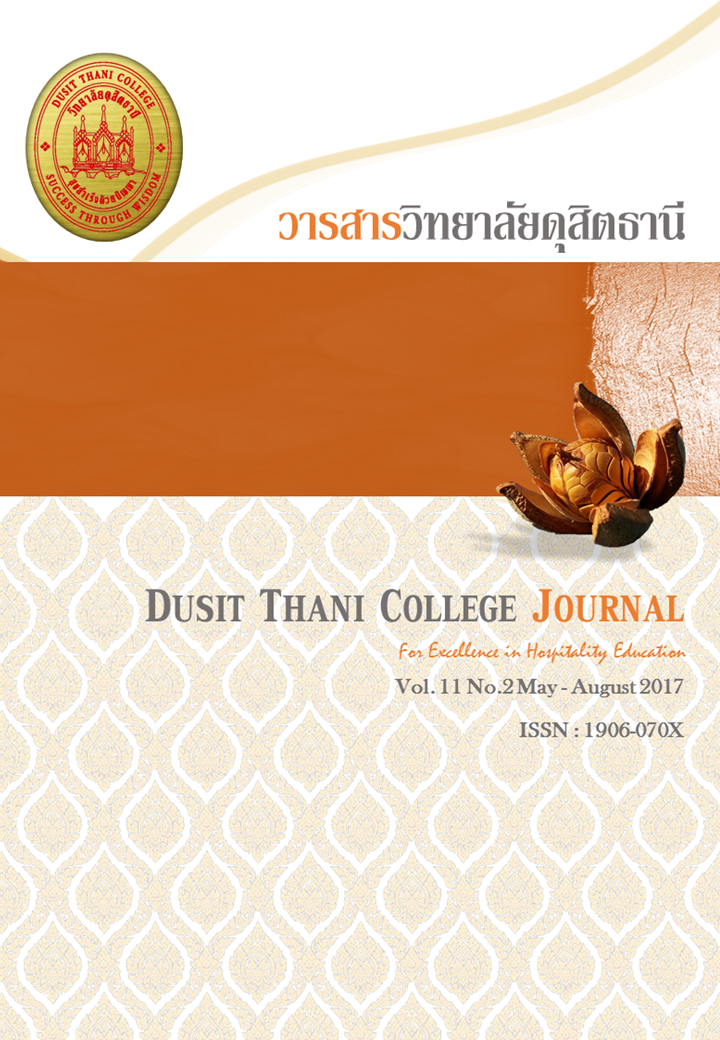Using Formative Research to Develop Educational Quality
Main Article Content
Abstract
Formative research, which aims to improve thinking or theories based on the progressive assessment, is an innovative research methodology that brings about last and ongoing work development. This research occurs before or while the program is implemented in order to find new and better points of development. In addition, it is a Research and Development or Action Research that creates to improve design theory for teaching and learning practices. The research results revealed improving guidelines for work and guided modification for the current or the new invention theories in working strategies. This research methodology was suitable for educational development, especially for teachers in creating educational innovation that leads to learners’ development, which was not restricted only on learning activities but also expanded to curriculum development, educational guidance, and management in order to enhance sustainable educational development. Moreover, the content of this research will promote understanding of formative research for those who are interested in this area. In other words, they will be able to understand approaches, procedures, and be able to aware when selecting formative research. Also, this research promotes cooperation in conducting formative research among researchers, educational scholars, and instructors. In this regard, the focus of formative research is on improving and developing design theory, which aims at developing learning or related factors that support learning and the development of educational quality of learners. The research starts from the study on the characteristic of the target group in terms of the current conditions and the expected conditions. The study on the differences between those conditions is performed to identify the development guidelines in accordance to research objectives. This process is directly response to leaners’ needs which allow them to learn every lesson appropriately and also to meet the researcher and instructors’ expectation which effects to sustainable development of education quality.
Article Details
Article Screening Policy
- All research and academic articles to be published must be considered and screened by three peer reviews in the relevant field / article.
- All articles, texts, illustrations and tables published in the journal are the personal opinions of the authors. Editors don't always have to agree. And no responsibility whatsoever is the sole responsibility of the author.
- The articles to be published must never be published. Where did you first publish? And not in the consideration of other journals If the audit found that there has been a duplicate publication It is the sole responsibility of the author.
- Any article that the reader sees as being plagiarized or impersonated without reference. Or mislead the work of the author Please let the journal editor know it will be your greatest blessing.
References
/socialmarketing/training/index.htm. Access : June 6, 2015.
Clonts, J. G.. Formative evaluation of an instructional theory for increasing awareness
of ethical issues. (Online). Available : http://search.proquest.com/docview/304042640
/abstract/F23C0B19F23F41F5PQ/1?accountid=44800. Access : June 12, 2015.
Corey, E.. Formative research: What, why, and how. (Online). Available : http://www.gfmer.
ch/SRH-Course-2010/Geneva-Workshop/Formative-research-Corey-2011.htm. Access:
June, 6 2015.
Dick, W. and Carey, L.. The systematic design of instruction. Glenview, IL: Scott, Foresman,
1990.
English, R. E.. Formative research on the elaboration theory of instruction. (Online).
Available : http://search.proquest.com/docview/303987531/fulltextPDF/3CB9C
4B2381449B3PQ/1?accountid=44800. Access : June 10, 2015.
English, R. E. and Reigeluth, M. R.. “Formative research on sequencing instruction with
the elaboration theory.” Educational Technology Research and Development.
44, 1 (March 1996) : 23-42.
Farmer, T. M.. A refinement of the ARCS motivational design procedure using a
formative evaluation methodology. (Online). Available : http://search.proquest. com/docview/303769703?accountid=44800. Access : June 10, 2015.
Hsu, C. Y.. Formative Research on an Instructional Design Model for the Design of
Computer Simulation for Teaching Statistical Concepts. (Online). Available :
https://etd.ohiolink.edu/rws_etd/document/get/ohiou1258048389/inline. Access :
June 6, 2015.
Kim, Y.. Formative research on the Simplifying Conditions Method for Task analysis
and sequencing of instructional content. (Online). Available : http://search.proquest.
com/docview/304115260/. Access : June 18, 2015.
Kim, Y. and Reigluth, C. M.. Formative Research on the Simplifying Conditions Method
(SCM) for Task Analysis and Sequencing. (Online). Available : http://files.ericed.gov/
fulltext/ED397804.pdf. Access : June 6, 2015.
Naugle, L. R.. Formative research of the reigeluth process model and an effort to
initiate school. (Online). Available : http://search.proquest.com/docview/30425
3783?accountid=44800. Access : June 18, 2015.
Reigeluth, C. M.. “Educational technology at the crossroads: New mindsets and new
directions.” Educational Technology Research and Development. 37, 1
(March 1989) : 67-80.
Reigeluth, C. M. and Frick, T. W.. Formative research: A methodology for creating and improving design theories. (Online). Available : http://www.indiana.edu/~syschang/
decatur/documents/ 26formres.pdf. Access : June 6, 2015.
Roma, C. M.. Formative evaluation research on an instructional theory for Understanding
(Online). Available : http://search.proquest.com/docview/303897174?accountid=44800.
Access : June 15, 2015.
Saeteng, S.(2008). Effects of using formative research to develop reading habits of seventhgrade students. A thesis for the Master of Education Program in Educational Research. Graduate School. Chulalongkorn University, 2008.
Shon, M.. Formative research on an instructional theory for the design of computer-
based simulations for teaching causal principles (Online). Available : http://search.
proquest.com/docview/304306443?accountid=44800. Access : June 14, 2015.
Simmons, J. L.. Formative evaluation research on an instructional theory for teaching causal principles (Online). Available : http://search.proquest.com/docview/303997999?
accountid=44800. Access : June 11, 2015.
Watson, W. R.. Formative research on an instructional design theory for educational
video games. (Online). Available : http://search.proquest.com/docview/304854026?
fromunauthdoc=true. Access : June 6, 2015.
Wongwanich, S. “Formative Research: The research to improve performance
continuously.” The Teachers' Council of Thailand Annual Conference 2013
“The research to improve performance continuously”. Bangkok: Si Anan Printing Co., Ltd, 21-27, 2013.
Wongwanich, S., Piromsombat, Ch., Klaikleng, P., & Sriklaub, K.. Strategies for driving
education reform policy: A formative research and development (Research
report). Bangkok, Prikwan Graphic, 2013.
Yagodzinski, E. D.. Formative Research on an Instructional Design Theory for Online
Learning Communities: A Higher Education Faculty Development Case.
(Online). Available : http://eric.ed.gov/?q=Formative+Research+&id=ED538568.
Access : June 6, 2015.


